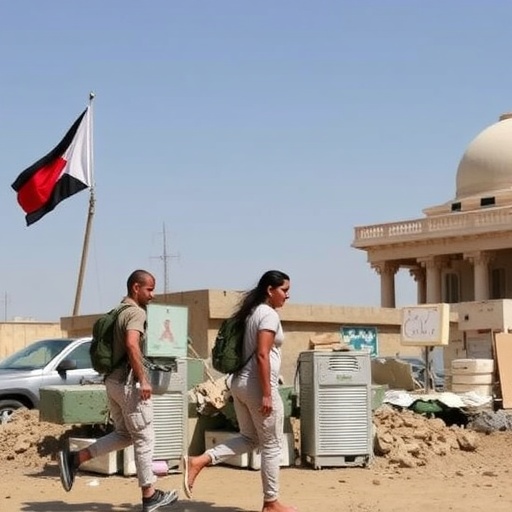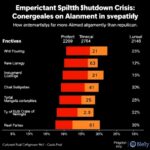White House Struggles to Prevent Israeli Escalation in Gaza as Ceasefire Frays Under Mutual Accusations
In a tense standoff that threatens to unravel months of fragile peace efforts, the White House is grappling with mounting challenges to stop Israel‘s right-wing government from launching a major military offensive in Gaza. As accusations of ceasefire violations fly between the two sides, President Joe Biden’s administration faces a high-stakes test of its foreign policy in the Middle East, with diplomats working around the clock to avert a humanitarian catastrophe.
The fragile ceasefire, brokered in late 2023 after intense international mediation, has held tenuously amid ongoing skirmishes. However, recent reports of Israeli airstrikes and Palestinian rocket fire have escalated fears that full-scale conflict could resume imminently. U.S. officials, speaking on condition of anonymity, revealed that behind-the-scenes negotiations have hit repeated roadblocks, with Israel citing security threats from Hamas as justification for preemptive actions.
This development comes at a critical juncture for the Biden administration, which has prioritized de-escalation in the region as part of its broader foreign policy agenda. With the U.S. presidential election looming, any failure to contain the crisis could undermine America’s credibility as a mediator in global hotspots.
Biden’s Diplomatic Marathon to Rein in Israeli Hardliners
President Biden’s team has launched an unprecedented diplomatic blitz to dissuade Israel‘s government from escalating operations in Gaza. Secretary of State Antony Blinken held virtual talks with Israeli Prime Minister Benjamin Netanyahu on Tuesday, urging restraint and emphasizing the risks of renewed violence. “The White House is committed to a sustainable peace, but that requires all parties to honor the ceasefire,” Blinken stated in a press briefing, his tone laced with urgency.
Behind closed doors, U.S. envoys have been shuttling between Washington and Jerusalem, offering incentives like enhanced military aid packages tied to compliance. Yet, sources familiar with the discussions say Netanyahu’s coalition, bolstered by far-right partners, remains defiant. “They view any perceived weakness in Gaza as an existential threat,” one senior White House official confided, highlighting the ideological chasm that complicates negotiations.
The administration’s efforts extend beyond bilateral talks. Biden has personally appealed to Arab allies, including Egypt and Jordan, to pressure Hamas into de-escalating. In a recent phone call with Egyptian President Abdel Fattah el-Sisi, Biden reportedly stressed the need for unified regional support to enforce the ceasefire. These maneuvers reflect a multifaceted foreign policy approach, blending carrots and sticks to maintain stability.
Statistics underscore the stakes: Since the ceasefire took effect, over 1,200 aid trucks have entered Gaza through Rafah, delivering essential supplies. But disruptions from alleged violations have already halted convoys twice this month, exacerbating a humanitarian crisis where 2.3 million Palestinians face acute food insecurity, according to UN reports.
Israeli Cabinet’s Push for Gaza Offensive Amid Security Fears
Israel‘s right-wing government, led by Netanyahu, has ramped up rhetoric calling for a decisive strike in Gaza to neutralize Hamas threats. Defense Minister Yoav Gallant announced on Wednesday that intelligence indicates imminent attacks from militant groups, justifying preparations for “targeted operations.” This stance has drawn sharp criticism from the White House, which fears it could derail the ceasefire entirely.
Within Israel, public opinion is divided. A recent poll by the Israel Democracy Institute shows 58% of Israelis support resuming military actions if ceasefire terms are breached, up from 45% last month. Netanyahu’s coalition partners, including hardliners like Itamar Ben-Gvir, have accused the U.S. of meddling in Israel‘s sovereign defense decisions. “We won’t let external pressures tie our hands when our citizens’ lives are at stake,” Ben-Gvir declared in a Knesset speech.
The government’s preparations are no mere bluff. Satellite imagery analyzed by the Associated Press reveals increased troop movements near the Gaza border, with armored units repositioning for potential incursions. This buildup has alarmed international observers, who warn of a repeat of the 2021 conflict that killed over 250 Palestinians and 13 Israelis.
From a foreign policy perspective, the White House sees this as a direct challenge to its alliance with Israel. Aid to Israel totals $3.8 billion annually, but Biden has hinted at conditional reviews if escalation occurs, a rare public signal of leverage.
Ceasefire Breaches Spark Cycle of Retaliatory Strikes
The ceasefire in Gaza is hanging by a thread, with both Israel and Palestinian factions trading blame for a series of breaches that began escalating last week. On Monday, Israeli forces conducted airstrikes on what they described as Hamas command centers in northern Gaza, killing at least five militants and causing collateral damage to civilian areas. Hamas retaliated with rocket salvos toward southern Israel, intercepted by the Iron Dome system but heightening civilian fears.
A timeline of events reveals a dangerous pattern:
- October 15: UN monitors report unauthorized Israeli patrols near the border, prompting Hamas warnings.
- October 18: A Palestinian drone incursion triggers Israeli artillery response, the first major violation in weeks.
- October 20: White House issues a statement calling for de-escalation, but skirmishes continue.
- October 22: Netanyahu authorizes limited strikes, citing “imminent threats.”
These incidents have displaced thousands in Gaza, with the World Health Organization noting a 30% spike in trauma cases. “Every breach erodes trust and pushes us closer to the brink,” said UN Special Coordinator for the Middle East Peace Process, Tor Wennesland, in a statement to the Security Council.
The White House‘s foreign policy team is monitoring these developments closely, deploying additional intelligence assets to verify claims. U.S. Ambassador to the UN Linda Thomas-Greenfield has scheduled emergency consultations, underscoring the international dimension of the crisis.
Mutual Finger-Pointing Strains US-Israel Alliance
Accusations are flying thick and fast, straining the historically ironclad US-Israel alliance. Israel accuses Hamas of using the ceasefire as a cover to rearm, pointing to smuggled weapons detected by IDF surveillance. In turn, Palestinian leaders, including Hamas spokesperson Sami Abu Zuhri, claim Israel is deliberately provoking conflict to justify land grabs in the West Bank.
“The White House must recognize that Israel‘s actions are the real threat to peace,” Abu Zuhri told Al Jazeera, echoing sentiments from Gaza’s streets where protests against the strikes have erupted. On the U.S. side, National Security Advisor Jake Sullivan emphasized in a CNN interview, “We’re calling out violations from all parties—no exceptions—to preserve the ceasefire.”
This blame game has ripple effects on foreign policy. Progressive Democrats in Congress, led by figures like Rep. Rashida Tlaib, are pushing for aid restrictions on Israel, while pro-Israel lobbies like AIPAC defend the government’s right to self-defense. A bipartisan letter signed by 150 lawmakers urges Biden to mediate impartially, highlighting domestic political pressures.
Economically, the tensions are costing dearly. Gaza‘s reconstruction, estimated at $20 billion by the World Bank, relies on ceasefire stability. Disruptions have already delayed projects, leaving 80% of buildings damaged from prior conflicts unrepaired.
Global Repercussions and US Foreign Policy Crossroads
The brewing crisis in Gaza is sending shockwaves across the globe, testing the White House‘s foreign policy framework. European allies, including the UK and France, have expressed alarm, with EU foreign policy chief Josep Borrell warning of “catastrophic consequences” if escalation occurs. China and Russia, meanwhile, are capitalizing on the discord to position themselves as alternative mediators, further complicating U.S. influence.
In the broader Middle East, the standoff risks derailing normalization efforts between Israel and Arab states under the Abraham Accords. Saudi Arabia has paused talks on joining the pact, citing unresolved Palestinian issues. “Peace with Israel cannot come at the expense of Gaza‘s suffering,” a Saudi official remarked anonymously.
Looking ahead, the White House is preparing contingency plans, including potential UN resolutions to enforce the ceasefire. Biden’s upcoming summit with Netanyahu could be pivotal, with analysts predicting a mix of tough love and reassurances to mend ties. If successful, it might stabilize the region; failure could embolden extremists on both sides, prolonging the cycle of violence.
Humanitarian organizations are bracing for the worst, calling for immediate aid corridors. As the sun sets over Gaza‘s battered skyline, the world watches anxiously, hoping U.S. diplomacy can thread the needle between allyship and global stability. The path forward demands bold action from the White House, with implications that could reshape foreign policy for years to come.








